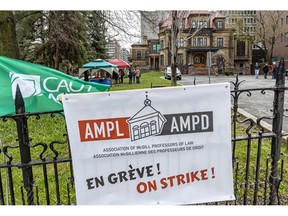About half the 58 scholarly associations participating in an academic congress have moved events to other Montreal universities or online only.

Article content
More than two dozen academic associations have cancelled conferences at McGill University due to an ongoing law professors’ strike and, in some cases, the university’s response to pro-Palestinian protests on campus.
The conferences are part of the annual Congress of the Humanities and Social Sciences, the largest academic gathering in Canada, which began last week at McGill and runs until Friday.
Advertisement 2
Article content
Around half of the 58 scholarly associations participating in the congress have moved all of their events to other Montreal universities or are holding them entirely online.
Joao Velloso, a vice-president of the Canadian Law and Society Association and a law professor at the University of Ottawa, said his association decided in May to find a new location because striking workers aren’t legally allowed to enter their workplace and the slow pace of talks made it seem likely the strike, which began April 24, would still be ongoing.
“Regardless of questions of principle, of crossing the picket line or not, which are definitely important, we had quite concrete concerns that those who were organizing things, that were participating in key sessions and so on, they could not be there,” he said in an interview.
He said congress organizer the Federation for the Humanities and Social Sciences, initially wanted his association to pay damages for moving away from McGill, to the Université du Québec à Montréal.
Velloso said there were also concerns about safety on the McGill campus after police earlier this month used tear gas and batons to remove pro-Palestinian protesters who had been occupying a university administration building and to disperse demonstrators outside.
Article content
Advertisement 3
Article content
“I’m not encouraging any of my members to go to McGill for academic-related events if there are safety concerns in case of police intervention and there is no plan,” he said, adding that bystanders can easily get caught up, using the example of bar patrons who were pepper sprayed by police while sitting on a St-Denis St. terrasse during the 2012 student strike.
The Canadian Society for the Study of Education, which had already begun moving events off-campus, said it wouldn’t have any events at McGill after the June 6 police intervention, while the Canadian Sociological Association moved its conference completely online. The CSA said more than half the participants who had registered for its events weren’t planning to attend in-person due to the strike and concerns about the treatment of student protesters.
Congress organizers say 29 scholarly associations have held — or are holding — at least some of their events at McGill, though among that group are several associations that have issued statements in support of the striking professors.
Donna Trembinski, a history professor at St. Francis Xavier University in Nova Scotia, said she attended the congress to chair a roundtable about an award-winning book written by a more junior colleague, but that she was conflicted about the decision.
Advertisement 4
Article content
Trembinski, who said that she would have cancelled if she was presenting a paper of her own, said that presentations and academic engagement at conferences are among the factors considered when a professor is seeking tenure, and that it could hurt a more junior academic’s career to cancel after receiving funding to attend.
Jeffrey Sachs, a political science professor at Acadia University, said boycotting the conference was a difficult choice, but the only right one.
McGill is one of the only major universities in Canada that isn’t unionized, he said, adding that university administrators could end the strike by bargaining in good faith.
“All the basic protections and freedoms that scholars elsewhere have, they deserve it too. And the senior administrators have, in my opinion, treated this union so poorly that it is incumbent on the rest of the Canadian academy to support them,” he said.
The Canadian Association of University Teachers has asked tenured professors to avoid the conference, while acknowledging that skipping the conference can be more difficult for more junior members.
Advertisement 5
Article content
The striking professors want university regulations to be enshrined in a collective agreement, so they can’t be changed unilaterally by the administration; increased transparency around how merit-based pay increases are awarded; and for professors to have more say in decision making, said Kirsten Anker, vice-president of the Association of McGill Professors of Law.
The university has met once with strikers since they walked off the job and doesn’t plan to meet with them again until the end of August, she said.
In an emailed statement, the Federation for the Humanities and Social Sciences said it offered associations a choice to shift events to its virtual platform and that it “made no intervention in the associations’ choice to relocate the in-person activities of their conference.”
“Each year of Congress takes place in a unique contemporary context, and for Congress 2024, this includes the ongoing strike by the Association of McGill Professors of Law,” said Karine Morin, the Federation’s president and CEO. “It is precisely during times like these that coming together, highlighting the important conversations within our disciplines and demonstrating their impact, is critical, and Congress is the best forum to accomplish this.”
More than 8,600 people were registered to attend in-person or online.
McGill did not respond to a request for comment on Tuesday morning.
Recommended from Editorial
Article content





